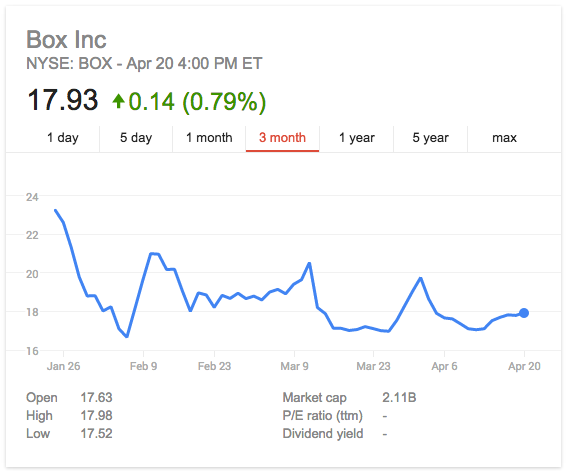Box will be okay. Leave Box alone.
Quentin Hardy via The New York Times argues “Box, Provider of Cloud-Computing Services, Faces Make-or-Break Moment”:
For Box to compete, it has to get other people to build great things on what it has built in the same way Apple and Google got app makers to create tools that made their mobile software indispensable.
At a company conference this week, Box, which has so far focused on Internet data storage and collaboration technology, will explain how it plans to help other businesses build their own cloud services. The goal is to create a so-called ecosystem that ensures continued growth just as Microsoft did with PCs and Apple did with the iPhone.
If the plan does not work, it is doubtful that Box will survive as an independent company, and Mr. Levie, for all those high hopes, will become a footnote, someone with a great idea who could not quite turn it into a lasting business.
“The writing is on the wall,” said Norman Young, an analyst at Morningstar. “They know they need to innovate. What separates the winners is supplying a valuable and necessary service.”
I don’t agree with this at all. Yes it would help if more developers built on top of Box, but Box is not merely a cloud storage company—it’s a full-service enterprise content collaboration platform which can adapt to virtually any industry. Meaning, cloud is only one part of what Box does; they also provide the security, content management, permissions, workflow, search, data prevention, and other layers that not only give stability to a business that runs on data, it also helps them save money by bundling all these necessities for the enterprise in one subscription based service.
Just how flexible is it? It’s used by over 240,000 companies and 99% of the Fortune 500 (aside from Microsoft, which has its own cloud platform) with customers in the biggest firms in advertising, construction, entertainment, government, and healthcare just to name a few. These range from personal use all the way to 8-figure deals recurring annually and the more these companies use Box, the service becomes more valuable and indispensable to them, which means their customer lifetime value only increases over time.
NYSE: BOX  #
#
Source: Google Finance (As of 4.20.15) #
And yet, there’s massive doubt about Box that seems to be prevalent in the media, which makes me think that perhaps Wall Street just doesn’t fully understand the dynamics of subscription-based software-as-a-service companies. Per the report:
In its last fiscal year, Box lost $167 million on revenue of $216 million. That was a 74 percent revenue gain from the year before, with a 5 percent bigger net loss. This year, revenue is expected to grow by about 30 percent, a marked slowdown that Mr. Levie hopes the new developer strategy may also turn around. As of its latest earnings report, in March, Box had $330 million in cash.
So revenue grew 74 percent and will grow another 30 percent this year? That means the business is going great! Even though there are heavy losses, that’s natural especially for a SaaS company like Box where aggressive investment is necessary upfront in order to capture huge corporate clients and eventually reap proportionately huge recurring gains in the future. Customer acquisition costs are much higher because there’s marketing, sales, and implementation costs early on where the company would need a certain amount of time before it can break even. But when they do, their potential revenue per enterprise customer can multiply many times over making way for lucrative profit margins. Even more, with Box for Industries, as they capture clients in different sectors, they get a feedback loop of getting the sale and learning more about that particular sector’s needs, giving them an advantage to eventually become the standard within that industry.
As Levie argued: “It becomes obvious why we were making these investments. We are going after a market worth tens of billions of dollars. It behooves us to scale up to reach that opportunity.”
Box will be okay. Something has to go severely wrong for their business to go sideways or to require an acquisition any time soon. Plus, it’s only been 3 months since their IPO! That’s not nearly enough time to judge the long-term durability of a public company. Their business is a lot stabler than what people make it out to be, and most of it the negative news is just media hoopla that keeps getting recycled. There may be losses in the beginning, but it doesn’t take away from how their revenue will grow as more companies sign up and their customers renew. As it stands, Box is expected to hit around $1 billion in revenues sometime in 2019. How that’s a call for make or break, I’m not sure.
